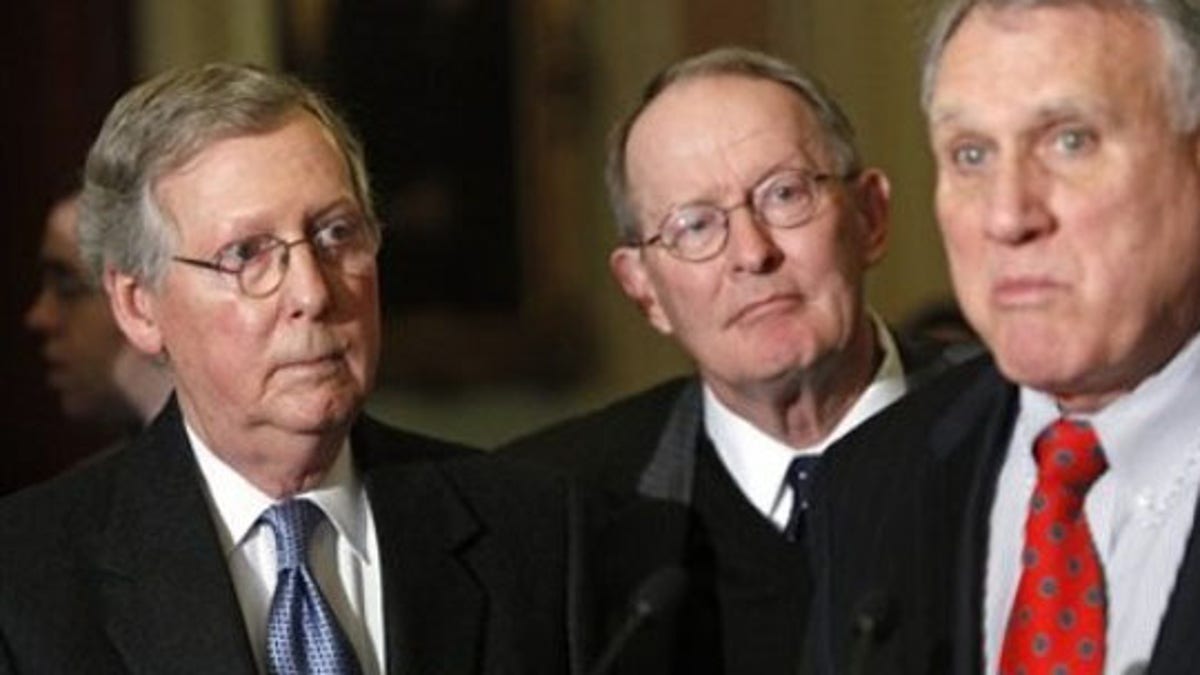
Tuesday: Senate Minority Leader Mitch McConnell of Ky., left, and Sen. Lamar Alexander, R-Tenn., center, listen to Senate Minority Whip Jon Kyl of Ariz., have tried unsuccessfully many different ways to stop the health insurance bill. (AP Photo)
As Democrats plug away toward final passage of a health insurance overhaul, major labor unions are pressing the Senate to strip a tax on high-value insurance plans from the health care reform bill, putting them at odds with other labor groups getting exemptions from that very requirement.
Unions ranging from the powerful AFL-CIO to the National Education Association to the Communications Workers of America are decrying the provision in the Senate health package that would impose a 40 percent "excise tax" on insurance companies for "Cadillac plans" with high-cost premiums.
The unions claim the tax will end up hitting the middle class hard and say Congress should instead use the House-passed idea of simply increasing income taxes on wealthy individuals.
"The health plan excise tax will not let families keep the good health plans they have now," CWA President Larry Cohen said in a statement Tuesday. His group argues that insurance companies will end up reducing benefits to avoid the tax.
But a handful of labor interests have managed to get partial exemptions from that fee. Most recently, Senate Majority Leader Harry Reid's additions to the health care bill slipped in "longshore work" on the list of "high-risk" occupations to which the tax would not apply in full.
That list includes workers in construction, mining, electrical line repair and other fields.
Craig Merilees, a spokesman for the International Longshore and Warehouse Union, told FoxNews.com that the provision is not a full exemption. Rather, he said it merely raises the threshold for the value of plans to which the tax would apply -- from $23,000 to $26,000.
He said the language was included because longshore workers are in a "high-hazard" category, and their health care plans need to be allowed to cover the "serious dangers" they face on the job.
"They die much more frequently on the job than other workers, and they are seriously injured at a much higher rate than other workers," he said.
But for other unions, the tax on Cadillac plans has become a bone of contention between them and Democrats whom they'd otherwise support. While the unions support health care reform, they want Congress to figure out a different way to raise money.
In the Senate bill, the 40 percent tax would apply to premiums costing more than $8,500 a year for individuals and $23,000 for families.
"The benefits of hard-working Americans cannot be taxed to pay for health care reform -- that's no way to rein in insurance companies and it's the wrong way to pay for health care reform," AFL-CIO President Richard Trumka said in a recent statement.
The House bill, by contrast, raises income taxes on people earning more than $500,000 a year and couples earning more than $1 million.
The Senate exemption is just one of many provisions that have raised additional questions about reconciling the bill with a House version.
The Senate votes Wednesday afternoon on a last procedural motion -- one requiring 60 votes -- before passage that needs only 51 votes. Lawmakers agreed to move up to 8 a.m. ET Thursday morning so members and their staffs could leave town in time for Christmas and ahead of predicted storms around the country.
Republicans have tried to slow up the bill, and planned to raise a point of order on the question of whether it's constitutional to require almost every American to buy health insurance. While they are unlikely to win the vote, several organizations are already getting ready to challenge the new law in the court system.
But even Senate passage does not end the process. The Senate measure would still have to be matched to the differing bill passed by the House of Representatives in November. Some lawmakers have predicted the House will roll over in order to avoid a shoot-out that would put President Obama's top domestic priority at risk just before he is to give his first State of the Union address.
But aside from the rules on Cadillac plans, the two versions differ significantly on abortion funding ban language, which is much stronger in the House bill, as well as the so-called public option, which the Senate eliminated in favor of deeper regulation of private insurers.
Senate moderates have said no to a final deal that includes government-run insurance while House Democrats who oppose abortion -- like Rep. Bart Stupack of Michigan who led the charge for explicit restrictions on abortion funding in the House plan -- say a Senate compromise is too weak.
The bills do share some commonalities. Both put their costs at around $1 trillion over 10 years and require nearly all Americans to have health insurance -- whether paid for by employers, individuals or the government. Both expect cuts in Medicare funding to provide some of the expenses.
The bills also prevent insurance companies from denying coverage to people with existing health conditions and create insurance exchanges through a marketplace where private insurers would sell health plans that meet minimum standards.
Fox News' Judson Berger and The Associated Press contributed to this report.




